While the news of Mahsa Amini’s death in police custody in September 2022 sparked protests across Iran, it is not the first time Iranian women and girls have been at the forefront of revolution, The Guardian reports (above).
As Iran remains wracked by mass civil disobedience, nation-wide protests and industry-wide labor strikes, it is evident that the Islamic Republic cannot reform, and the great majority of Iranians demand regime change and secular democracy, notes Stanford University’s Iranian Studies Program:
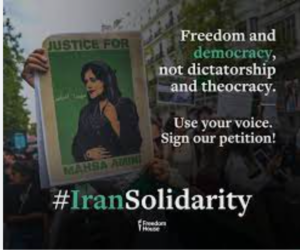 Following the killing of Zhina Mahsa Amini, a 22-year old Kurdish woman, by the “morality police,” thousands upon thousands of protestors, led by young women and girls, have joined the rallying call “Jin, Jiyan, Azadi” (“Woman, Life, Freedom”) that originated with Kurdish feminists 43+ years ago. Over 500 protestors have been killed by the police, countless others have disappeared, over 20,000 students, activists, journalists, workers, artists, lawyers and other protesting members of civil society have been imprisoned, and several have been executed on bogus charges.
Following the killing of Zhina Mahsa Amini, a 22-year old Kurdish woman, by the “morality police,” thousands upon thousands of protestors, led by young women and girls, have joined the rallying call “Jin, Jiyan, Azadi” (“Woman, Life, Freedom”) that originated with Kurdish feminists 43+ years ago. Over 500 protestors have been killed by the police, countless others have disappeared, over 20,000 students, activists, journalists, workers, artists, lawyers and other protesting members of civil society have been imprisoned, and several have been executed on bogus charges.
This coming weekend, the program hosts two days of Dialogues on Iran’s Transition to Secular Democracy, co-organized by Gozar.org, an independent expert collective, KAI, and the Hamid and Christina Moghadam Program in Iranian Studies at Stanford (details below).
The scale and gravity of Iran’s violations of human rights amount to a crime against humanity, according to a UN human rights expert. Javaid Rehman, the United Nations Special Rapporteur on human rights in Iran was “outraged” that the regime had executed at least four persons associated with recent protests after arbitrary, summary, and sham trials marred by torture allegations.
At least 17 protestors had already been sentenced to death and more than 100 currently faced charges that carried the death penalty, Rehman added, presenting his latest report to the UN Human Rights Council.
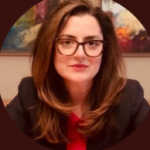 Reza Pahlavi, son of the former shah of Iran, aims to shepherd a process of democratization that would allow free choice over the future form of government and establish the separation of powers with checks and balances and restraint on the executive, says Mariam Memarsadeghi (right), the founder and director of Cyrus Forum. He prefers to be called the “people’s advocate” rather than their leader, admitting from time to time—both to Western observers and to his ardent monarchist supporters—that he himself may prefer republicanism over constitutional monarchy, but that the people will decide their future in a free and fair vote.
Reza Pahlavi, son of the former shah of Iran, aims to shepherd a process of democratization that would allow free choice over the future form of government and establish the separation of powers with checks and balances and restraint on the executive, says Mariam Memarsadeghi (right), the founder and director of Cyrus Forum. He prefers to be called the “people’s advocate” rather than their leader, admitting from time to time—both to Western observers and to his ardent monarchist supporters—that he himself may prefer republicanism over constitutional monarchy, but that the people will decide their future in a free and fair vote.
Regardless of their choice, Pahlavi has pledged to keep out of the country’s daily politics, focusing instead on fostering the rise of a culture of democracy rooted in strong institutions, liberal education, and a vibrant civil society, she writes for American Purpose:
He will need to show an understanding not only of democratic ideals but also of the suffering and deep economic pain of the vast majority of Iranians. He urgently needs to present operational readiness—the strategic planning, the team, the international partnerships—to address his compatriots’ basic human needs in the precarious period of provisional governance should the regime fall….Chaos and instability could easily fill a vacuum left by a lack of practical preparedness. There is no telling when the regime may collapse, so Pahlavi must convey that he has the capacity not only to communicate and inspire but to execute. Iran’s next revolution may be farther along than even he realizes.
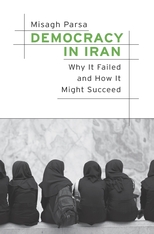 In a statement that went viral shortly after its release February 4, the leader of Iran’s Green Movement, Mir Hossein Mousavi, called for the drafting of a new constitution and the establishment of an “assembly of founders” to lead a democratic transition away from the Islamic Republic, adds analyst Kourosh Ziabari. Noting that Iranians have lost hope in the government reforming itself, Mousavi proposed a referendum on a revised or new constitution and the installation of a government that is rooted in the rule of law and reflects the will of the people.
In a statement that went viral shortly after its release February 4, the leader of Iran’s Green Movement, Mir Hossein Mousavi, called for the drafting of a new constitution and the establishment of an “assembly of founders” to lead a democratic transition away from the Islamic Republic, adds analyst Kourosh Ziabari. Noting that Iranians have lost hope in the government reforming itself, Mousavi proposed a referendum on a revised or new constitution and the installation of a government that is rooted in the rule of law and reflects the will of the people.
While Mousavi remains in captivity and doesn’t have a penetrating media presence, he retains influence and popular support, Ziabari observes. However much Mousavi’s legacy as a reformist has weakened his social capital, he has a base of supporters that can play a critical role in forging a new political reality.
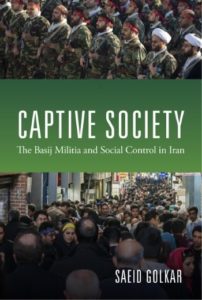 “The regime’s primary strategy has always been victory through terrorizing. Suppression is the regime’s only solution since it is incompetent and incapable of change or good governance,” said the University of Tennessee’s Saeid Golkar, the author of Captive Society.
“The regime’s primary strategy has always been victory through terrorizing. Suppression is the regime’s only solution since it is incompetent and incapable of change or good governance,” said the University of Tennessee’s Saeid Golkar, the author of Captive Society.
An additional motive for the executions was the leadership’s need to satisfy core supporters in organisations like the Basij, the volunteer militia that has been instrumental at countering the spontaneous and leaderless unrest, he told Reuters. “The regime wants to message its supporters that it will support them by all means.”
In fact, a key distinguishing factor between the recent protests and the previous ones is that Iranians have been forming coalitions to advocate for important structural and institutional changes in support of equality, human rights, democracy and freedom, observers suggest.
The leaderless nature of the demonstrations has also fueled democratic sentiments in Iran that have empowered ordinary Iranians to protest decades of unresponsive and unrepresentative government, add analysts Protesters are now shifting to more concerted efforts involving charters or bills of rights that outline their specific demands — yet another indication that Iranians are politicized, organized and mobilized as they push for change, they write for The Conversation:
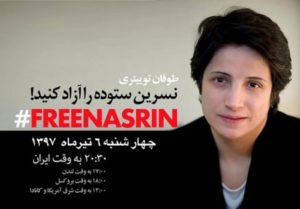
Credit: defendlawyers
In mid-February, coinciding with the 44th anniversary of the formation of the Islamic Republic of Iran, several civil society groups — including labour unions, student organizations and women’s and human rights groups — collectively publicized a joint charter outlining their minimum demands for a “new, modern, and humane society.” The charter focuses on the core demands of large sections of the Iranian population.
Dialogues on Iran’s Transition to Secular Democracy
Sat March 25th – Sun March 26th 2023, All day. RSVP
With more than 30+ panel talks, 24 roundtables, 50+ speakers, and more than 100+ experts and civil society activists, the two-day event aims to foster dialogue and debate on what is needed to transition to a secular democracy in Iran. Speakers include:
- Faraj Aalaei
- Founding General Partner at Candou Ventures
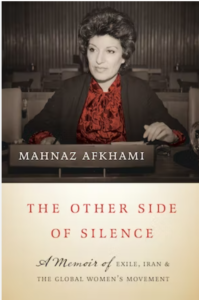 Mahnaz Afkhami (right)
Mahnaz Afkhami (right)
- Women’s Rights Activist
- Ali Afshari, PhD
- Researcher & Iranian Activist
- Nazanin Afshin Jam
- Human Rights Activist
- Shahriar Ahi, PhD
- Chairman Of The Board, New Media Productions
- Susan Akbarpour
- Investor, Entrepreneur & Board Member
- Kazem Alamdari, PhD
- Retired faculty of sociology, California State University
- Hicham Alaoui, PhD
- Director of the Hicham Alaoui Foundation
- Reza Alijani
- Journalist, Writer and Political Activist
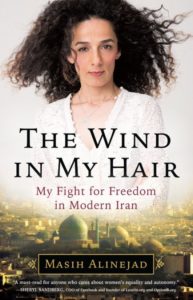 Masih Alinejad (right)
Masih Alinejad (right)
- Journalist & Women’s Rights Activist
- Asieh Amini
- Writer and Multicultural Communicator
- Mandy Ansari
- Founding Member of the Iranian Diaspora Collective, CEO of Modern Girl Media
- Bahar Ansari, JD
- Founder & Attorney at 2nd.law
- Haifa Asadi
- Ahwazi Women’s Rights Activist
- Kamal Azari, PhD
- Scholar in Community-based Democracy
- Robert Babayi, JD
- Principal, Vector IP Law Group
- Fariba Balouch
- Women’s Rights Activist
- Nazanin Bonyadi
- Actress and Human Rights Activist
 Roya Boroumand, PhD
Roya Boroumand, PhD
- Cofounder of the Abdorrahman Boroumand Foundation (right)
- Nadereh Chamlou
- Senior Fellow, Atlantic Council
- Saeid Dehghan
- Human Rights Lawyer
- Larry Diamond, PhD
- American Political Sociologist
- Hamoun Dolatshahi
- Director and Writer
- Shirin Ebadi, JD
- Political activist and Nobel Laureate
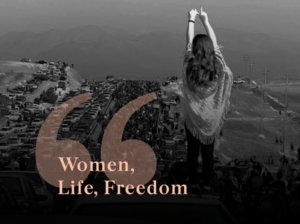 Hamed Esmailioun
Hamed Esmailioun
- Social Activist & Author
- Maryam Farboodi, PhD
- Assistant Professor of Finance, MIT
- Mehdi Fatapour
- Representative of Organization of Iranian People’s Fedai Guerrillas
- Iman Foroutan, PhD
- CEO & Chief Promotion Strategist at Contest Factory
- Hadi Ghaemi, PhD
- Executive Director at the Center for Human Rights in Iran
- Fatemeh Haghighatjoo, PhD
- CEO, Nonviolent Initiative for Democracy
- Homa Hoodfar, PhD
- Professor of Anthropology at Concordia University
- Marjan Keypour
- Founder and Director, Alliance for Rights of All Minorities
- Behruz Khaligh
- Represenative of Iran’s Left Party
- Ahmad Kiarostami
- Entrepreneur
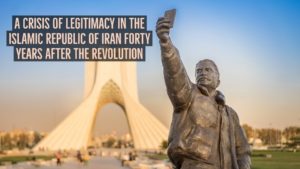 Kaveh Madani, PhD
Kaveh Madani, PhD
- UN Think Tank Director; CUNY-CREST Faculty
- Faraz Maghami, JD
- Barrister at Law
- Ammar Maleki, PhD
- Faculty at Tilburg University; Director at GAMAAN
- Michael McFaul, PhD
- American Academic and Diplomat
- Abbas Milani, PhD
- Hamid and Christina Moghadam Director of Iranian Studies Program and Professor at Stanford
- Matin Mirramezani
- Co-Founder and COO at Generation Lab
- Abdullah Mohtadi
- Leader & Secretary of Komala Party
- Ali Mostashari, PhD
- CEO of LifeNome and Complexity Scientist
- Mani Mostofi, JD
- Director of Miaan Group
- Aliakbar Mousavi, PhD
- Human Rights Activist, Peace Technology Fellow
- Firouz Naderi, PhD
- Consultant, Coach, Strategist, Public Speaker
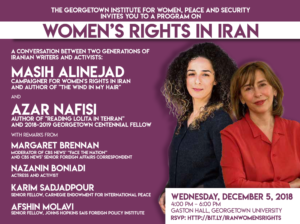 Sharon Nepstad, PhD
Sharon Nepstad, PhD
- Sociologist
- Reza Pahlavi
- Advocate for Freedom, Democracy, and Human Rights in Iran
- Hazhir Rahmandad, PhD
- Associate Professor of Management, MIT
- Satar Rahmani
- Instructor and Labor Activist
- Ali Rahnama, JD
- Civil Rights Attorney and Advocate
- Roya Rastegar, PhD
- Writer, Curator and Scholar
- Moniro Ravanipour
- Writer
- Erfan Sabeti
- Social Scientist
- Bashir Sadjad, PhD
- Software Engineer at Google
- Karim Sadjadpour
- Senior Fellow, Carnegie Endowment for International Peace
- Maryam Saeedi, PhD
- Assistant Professor of Economics, Carnegie Mellon University
- Homa Sarshar
- Journalist, Writer & Human Rights Activist
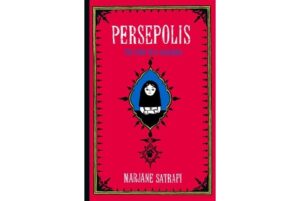 Marjane Satrapi
Marjane Satrapi
- Iranian Artist, Director, Writer
- Fatemeh Shams, PhD
- Persian Poet and Associate Professor, University of Pennsylvania
- Yazdan Shohadayi
- Secretariat of The Iran Transition Council
- Ali Shourideh, PhD
- Associate Professor of Economics, Carnegie Mellon University
- Behnam Tabrizi, PhD
- Teaching faculty and director of executive education, Stanford University
- Mona Tajalli, PhD
- Author and Associate Professor
- Nayereh Tohidi, PhD
- Professor Emerita CalState Northridge
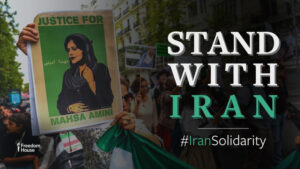 Bailey Ulbricht, JD
Bailey Ulbricht, JD
- Director of Stanford Humanitarian Program
- Allen Weiner, JD
- Senior Lecturer in Law, Stanford
- Mehdi Yahyanejad, PhD
- Internet Freedom Activist and Co-Founder Peachscore
- Majid Zamani
- Entrepreneur and Political Activist
- Mandana Zandian, MD
- Poet, Literary Critic, Social Activist
A two-day conference @stanford with 100+ experts and civil society activists aiming to foster dialogue and debate on what is needed to #transition to a secular #democracy in #Iran.
Event will be recorded and made available to public.
More info: https://t.co/aPeXonzqDx pic.twitter.com/ZDsso5tneH
— SU Iranian Studies (@StanfordISP) March 22, 2023







